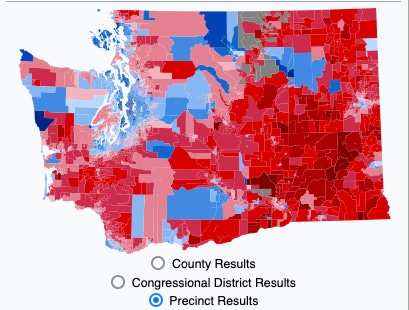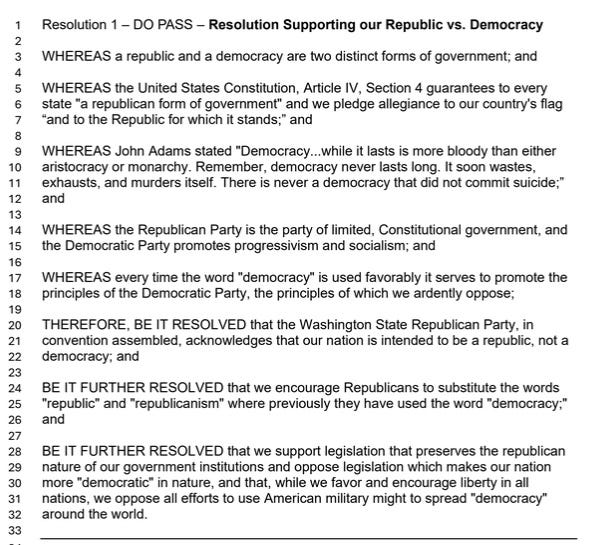Aloe dichotoma, the “quiver tree,” Desert Botanical Garden, Phoenix, AZ
Be it resolved….
I was a time zone away when the state Republican convention coalesced in Spokane a few days ago. The distance dissolved the question of whether to at least try to check it out in person, to look in on a gathering that is often mesmerizing—like the time, years ago, when the state Republicans met in Yakima and passed a resolution denouncing witchcraft. I was unaware then, as I am now, of a looming witch problem. Either through curiosity or appointments, I’ve visited every corner of the state, and photographed much of its midsection. I’ve never been pestered by witches.
Aside from my uncle Butch, the first prominent Republican I had any substantive interactions with was Harold Romberg, a Spokane insurance executive who was a member of the Washington State University board of regents. I got to know him when I was a reporter for the Daily Evergreen student newspaper in 1977-79. Romberg was a stolid, soft-spoken man who capably absorbed criticism from both left and right, though most vehemently from the right when he defended WSU President Glenn Terrell’s initiative to convene anti-racism workshops on campus during the civil rights movement. The second notable Republican I met was former governor and U.S. Senator Daniel Evans, the founder of Evergreen State College and easily among the most intelligent and admirable politicians in the state’s history.*
This was before Washington Republicans went rogue.
By rogue, I mean openly casting themselves as a culturally oppressed minority, trafficking in bogus voter fraud conspiracies, and bristling for divorce. In recent years, there has been a movement—formally proposed in legislation by two Spokane Valley state representatives—to carve out a new state of “Liberty” east of the Cascades. Liberty would encompass Spokane. The political tectonics of this half-baked initiative (a similar movement is bubbling up in eastern Oregon) are obvious. Liberty would transform eastern Washington into an extension of ultra-conservative Idaho. If this were to come to pass it would have dramatic consequences (i.e. access to reproductive health care for women) for the cities of Spokane and Pullman, two bluish islands in the red sea of the inland Northwest. The bill didn’t go anywhere—Republicans haven’t held a majority in either the state House or Senate since 2017 and there hasn’t been a Republican governor (John Spellman) since 1985. But as Washington Republicans have become more Trumpian, they’ve begun to rebel against the very legitimacy of democratic (small “d”) governance—a startling development and one we ignore at our peril.
Washington presidential election results, by precinct, in the 2020 election, with red reflecting precincts for Donald Trump and blue for Joe Biden. (source Wikipedia)
Much of the coverage of the Spokane convention last week focused on the raucous endorsement of a controversial and relatively unknown underdog—former Richland school board member Semi Bird. Bird would like to be Washington’s next governor. His rival Republican for the nomination—former sheriff and Congressman Dave Reichert—was absent from the Spokane convention. Reichert roundly denounced Bird’s endorsement and the process that led to it.
“The party’s been taken hostage by a group of people,” Reichert told the Spokesman-Review. “You can see that happening across the state.”
The unnamed “group of people,” of course, are MAGA/Trump supporters, the loudest and most ardent faction in the Republican Party in virtually every state, now, not just Washington. It made for a chaotic convention but, as Seattle Times columnist Danny Westneat was swift to point out, the assembled Republicans also registered their votes on democracy.
The Washington state capitol dome in Olympia, WA
It would be hard to improve on Westneat’s column. He’s been very focused (thankfully so) on the issue for some time—the weirdly simultaneous seizure of the American flag as a symbol of MAGA loyalty and the re-purposing of it as a weapon against anything that threatens Donald Trump—be it the judiciary, state and federal prosecutors, Democratic Party politicians, or democracy itself.
Westneat picked up on Reichert’s bitter lament that the state GOP was being held hostage.
“But there was another strain to the proceedings last weekend that didn’t get much attention,” Westneat wrote. “Political conventions are often colorful curiosities;” he continued, “this one took a darker turn. The Republican base, it turns out, is now opposed to democracy. Their words, not mine…”
The anti-democracy statement was cobbled into a resolution and passed by majority vote. It reads, at its conclusion: “Therefore, be it resolved, that the Washington State Republican Party, in convention assembled, acknowledges that our nation is intended to be a republic, not a democracy,” and goes on to add, among other phrases, “we support legislation that preserves the republican nature of our government institutions and oppose legislation which makes our nation more ‘democratic’ in nature…”
Here’s the full text:
To be sure, there is a long-running, hair-splitting dispute about whether there is a meaningful difference between a republic and a democracy. But it’s a spurious argument. A republic, by definition, is a democratic government in which representatives are elected to fulfill the will of voters in framing and enacting legislation. And while democracy can also be direct—as in citizens voting directly on referenda—this does not mean that republican, representative government is somehow exempt from adhering to the will of voters. To the contrary, the solvency of republican democracy is evaluated by how reliably elected representatives reflect the will of their voters.
That said, context is everything. The supposed debate between “republic” and “democracy” is really just a cover to promote minority rule and the abuses of power that come with it.
Perhaps the clearest evidence of this comes from the melee in Arizona.
It would be exhausting to fully inventory the litigation and antics unloosed by the MAGA movement in the Grand Canyon state, where there are countless of accusations from Republicans (including Trump) about “stolen” elections, but zero evidence to substantiate them.
Last week, an Arizona grand jury indicted seven Republican officials and 11 fake electors on felony counts of fraud, forgery and conspiracy as part of an effort to deliver Arizona’s 2020 electoral college votes to Trump. (Trump was also named, but as an “unindicted co-conspirator.”) The deeper story of how Arizona Republicans went off the rails is compiled in Robert Draper’s August 2022 article in the New York Times Magazine entitled: “The Arizona Republican Party’s Anti-Democracy Experiment.” Even prominent Republicans like Rusty Bowers, the Speaker of the Arizona House of Representatives, were targeted by their own party if they did not fall in line with Trump’s efforts to reverse the results of the 2020 Presidential election in Arizona that Trump lost by 10,000 votes. A signature of the Arizona uprising that culminated in criminal indictments last week was the open attack on “democracy.”
Wrote Draper: “(T) here is more at stake than the health of the Republican Party when its core activists, as well as a growing number of officials and those campaigning for governmental positions, openly espouse hostility not just to democratic principles but, increasingly, to the word “democracy” itself. It has long been a talking point on the right — from a chant at the 1964 Republican convention where Goldwater became the G.O.P. nominee to a set of tweets in 2020 by Senator Mike Lee of Utah — that the United States is a republic, not a democracy.”
The context is alarming, to say the least. It’s not just that Washington Republicans are frustrated at being in the minority party in the state. It’s also that democracy and democratic values undermine Trump’s legitimacy—i.e. his failure to win the popular vote in 2016, his delivered promise to stack the court with judges who would repeal Roe v. Wade, and now his open pledge to use the powers of government to exact “retribution” on those who’ve opposed him were he to become President again.
While both major parties have engaged in undemocratic practices like gerrymandering, what distinguishes the Republican Party (even preceding the reign of Trump) are concerted strategies to stack the courts, make it harder for African Americans and other minorities to cast their votes, and, through redistricting, magnify the effect of Republican votes while diminishing the weight of votes for Democrats.
I’ll dig deeper into the historic and political DNA of this trend another time. But the net result is conspicuous. The independent Economist Intelligence Unit now classifies the U.S. as a “flawed democracy”—not only less democratic than most of Europe but lagging behind Canada, Japan, Australia, Uruguay and Iceland, among others.
The EIU’s outlook is not optimistic:
“The US score for civil liberties, as well as other categories, may come under pressure in the run-up to and aftermath of the 2024 US presidential election. Mr Trump and his campaign team have spoken openly of using the Justice Department to prosecute political rivals; invoking the Insurrection Act to quell protests against his administration; installing loyalists across the civil service; and introducing ‘ideological screenings’ of immigrants, including on the basis of religion. If Mr Trump were to win the elections his administration would move forward with at least some of the policies. Meanwhile, many in the Democratic Party and the media have presented a second Trump presidency as an existential threat to US democracy. None of this bodes well for the post-election political landscape.”
The term “landscape” in this context is a worthy metaphor, in the sense that, on first impression, a landscape appears static on a day-by-day basis but can change dramatically in a lifetime, or less. Witness, for example, the rapid retreat of glaciers that have tourists flocking to Alaska and Glacier National Park in Montana before the ice sheets all but disappear. The political landscape takes the shape of how we practice governance that affects our public and private spaces.
As a Washingtonian and a Spokanite, I’ve come to appreciate how living in a “purple” county—cheek-by-jowl with the ruby red of Idaho—provides near daily reminders of how volatile politics and governance can be, whether it is access health care, the protection of natural resources, or the clear-eyed, open-hearted acceptance of racial and cultural diversity. As an American I’ve wanted to believe that at the end of the days our basic, mutual commitment—whether we identify as Republicans, Democrats or independents—is to the civility, maintenance and progress of democracy in the direction of a more just and equitable commonwealth.
To put it mildly, I’m no longer so sure we’re on the same page. As the recent fake elector scheme indictments of Republicans in Arizona, Georgia, Michigan and Nevada underscore, there is more than an “ends justify the means” attitude embedded in Trumpism. It’s not just ‘heads I win, tails you cheated’ trash talk. As the recent state indictments only add to those identified by federal prosecutors and Congressional investigators, a shocking number of Republicans actually give themselves permission to commit the crimes—to disenfranchise voters if the outcome doesn’t go their ways.
It’s nothing short of political witchcraft; a betrayal of our most basic civic compact.
—tjc
*Former Governor Evans joined a fellow prominent Republican—ex-senator and former state attorney general Slade Gorton—in a joint announcement in 2019, conspicuously disclosing neither had voted for Donald Trump in 2016, and had no intention of voting for him in 2020.










